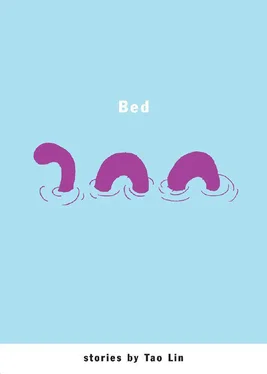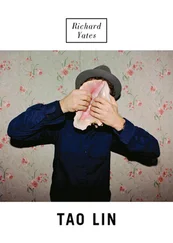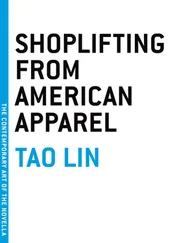Tao Lin - Bed
Здесь есть возможность читать онлайн «Tao Lin - Bed» весь текст электронной книги совершенно бесплатно (целиком полную версию без сокращений). В некоторых случаях можно слушать аудио, скачать через торрент в формате fb2 и присутствует краткое содержание. Год выпуска: 2007, Издательство: Melville House Publishing, Жанр: Современная проза, на английском языке. Описание произведения, (предисловие) а так же отзывы посетителей доступны на портале библиотеки ЛибКат.
- Название:Bed
- Автор:
- Издательство:Melville House Publishing
- Жанр:
- Год:2007
- ISBN:нет данных
- Рейтинг книги:5 / 5. Голосов: 1
-
Избранное:Добавить в избранное
- Отзывы:
-
Ваша оценка:
- 100
- 1
- 2
- 3
- 4
- 5
Bed: краткое содержание, описание и аннотация
Предлагаем к чтению аннотацию, описание, краткое содержание или предисловие (зависит от того, что написал сам автор книги «Bed»). Если вы не нашли необходимую информацию о книге — напишите в комментариях, мы постараемся отыскать её.
Bed — читать онлайн бесплатно полную книгу (весь текст) целиком
Ниже представлен текст книги, разбитый по страницам. Система сохранения места последней прочитанной страницы, позволяет с удобством читать онлайн бесплатно книгу «Bed», без необходимости каждый раз заново искать на чём Вы остановились. Поставьте закладку, и сможете в любой момент перейти на страницу, на которой закончили чтение.
Интервал:
Закладка:
In the apartment Sean had music on very loud. This was despairing guitar music from the mid 90’s. Chris had gone somewhere with Annie for the week. It was 3 a.m., and Sean was cleaning — going around with a trash bag, stuffing things in; humming harmonies and sometimes singing.
In the morning, Sean went for Chinese takeout. Back home, he put on despairing acoustic music. He ate, poured juice. The music was very good. Sean stopped for a moment and held himself very still. This is good, he thought. I’m being serious, he thought. “I am extremely happy,” he said aloud. He put his food down. He jumped on his brother’s bed. He lay down. He wanted to laugh or something. Love, he thought. He got up, turned off the music. He watched TV. He went to sleep.
It was dark out when Sean woke. He put on music, washed the dishes. He wiped the TV and the desk with wet paper towels, and the floor. He showered with the door open, the music loud. He went out for coffee. He stopped at a bookstore and got a job application. Outside, crossing Fifth Avenue, he looked up at the buildings and felt a kind of rapture, something of apology and thanks and intelligence — though maybe just a thing of coffee and wakefulness — forming, like a good idea (the world thinking hard, finally), here, in the little wind, the slightly infrared space between the buildings, the wet, shucked gemstars of the traffic lights, and all the glassy windows above, bright and comprehending as eyes, watchful as a world that wanted, truly, to know — and to love — all its lost and bewildered people.
Sean woke on his brother’s bed. “Sean,” Annie said. She and Chris were back. “Come with us to see a blockbuster Hollywood movie.” Her hair was dyed an inconsistent green, like a fern plant.
“Maryanne wants to meet you for a blind date,” Annie said in the movie theatre. She sat between Sean and Chris, leaned against Chris and looking at Sean. “Maryanne. Isn’t that a pretty name?”
“Maryanne, who is Maryanne,” Chris said.
“I like that name,” Sean said. He was thinking of a dream he had, a few days ago, in which love was a skeleton that hovered through the night; just one skeleton for all the world — a logistical mistake, Sean understood in his dream — gliding toe-swept over oceans, under bridges, through walls; the bones and ghost of it entering and leaving bedrooms at night, like a wantless thief; a clean, dead thing with the temperament of a cloud. The dream had gone on and on and was soothing in a chalky, religious way, like a sourceless and messageless yet somehow affecting prayer. Now, though, the whole thing seemed just irritating. The skeleton, Sean now felt, was not love, but some failed manifestation of love — high-flying and loud, jangling its bones, chomping its jaws in a false and godless laughter.
“Maryanne was dropped on her head as a small girl,” Annie was saying. “But instead of making her brain-damaged, it made her think beautifully and oddly. She was knocked sideways on the IQ scale, not downwards.”
“How come?” Sean said. He had spent the rest of last week renting low-budget, existential films, drinking beer and coffee, gazing somehow nostalgically from across the room at the bookstore job application — kind of depressed.
“How old is your sister?” Chris said.
Annie sat up very straight. “My sister,” she said. “She isn’t restrained by time or space. She’s not like that. I don’t know. She’s not a robot. This isn’t science fiction masterpiece theatre.” Annie paused. “I could say she’s ten or twenty but that wouldn’t be true. She’s just there . She’s not even a sister, really.” Annie laughed. She stood up. “Hey, wow,” she said. “There’s Maryanne.” She pointed at a girl sitting alone in the front row. “Sean, go sit by her. She’s lonely. Maybe a little hopeless, sitting in the front row. But look at her hair. She’s fixed it up, shampooed it.”
“I don’t know Maryanne,” Sean said.
“Where’s Maryanne?” Chris said without moving. “Thanks, Sean. For cleaning the apartment.”
“Maryanne,” Annie shouted. Some people, not the girl, turned around. “Go before the movie starts. Just point up here for confirmation, I’ll be waving.”
“No,” Sean said. Annie pulled him up. Sean looked around. The world seemed strange, but then it wasn’t strange anymore, it was just the world. “Okay,” he said. “But come with me.” He would go, he thought. He would get himself inescapably in love, like a good trouble; love would stare blankly at him, he would not flinch, and love, then, would murder him, drag him to a gray, underground place, freeze his corpse, and, over time, eat him. Annie pushed Sean into the aisle. She sat back down. Sean felt tall and dizzy. He went carefully down the steps. At the front row, he smiled at the girl, said something, and pointed back up at Annie, who was standing and waving. The girl stood up. Her face was startled and afraid. She was middle-aged. She touched her hair and sat down. Sean was looking, now, at the floor, and it seemed to Annie like he had fallen asleep, standing there. The lights went off.
Sean came back up and sat down. There was a small pounding at the back of his head, a tapping against the inside-back of his skull — the brain bored with itself; wanting out, perhaps, drilling slowly, wearily, at the bone.
“Don’t worry, Sean,” Annie whispered. She looked at him. She patted his thigh.
“Good one,” Sean whispered to her. It really was good, he thought.
Later, during the movie, Annie whispered in Sean’s ear, “That’s what you have to do. Pretend you know these people. Pretend they love you. They can love you. Think about it.” The movie was about James Bond, who had a speedboat that could, if the situation called for it, which it did — twice — fit in the palm of his hand. He was a very busy man, too busy for love — except for a terse, witty, hyper-sexy sort of love.
After the movie, they went for sushi. “Still believe I have a sister named Maryanne?” Annie said. “Think I’m making that up?”
“Maybe,” Sean said.
“I do,” Annie said. “She has the cataractous gaze of a child prodigy entering into a scorched land. One time she tossed an ice cream cone underhand into a third-floor window. The cold thing went without a sound into that hard, brick building. It was like a little epiphany of the physical world.”
“I like that,” Sean said.
“Annie. Listen to yourself,” Chris said. He stood up. “What are you doing right now?” He adjusted his pants and sat down. He had a look on his face, Sean saw, like he might scream in such a horrifyingly quiet, mutated, and frequencyless way that the rules of the universe would then have to be changed.
“You’re in a bad mood,” Annie said. She hugged Chris. She looked at him. “I love you,” she said.
“I didn’t mean to say that,” Chris said uncertainly. He looked away, loudly said, “I’m joking,” then looked back and began to talk about whether or not it was a crime against humanity to buy coffee from Starbucks. It was a public company, so was driven by profit, would create a greater divide between the rich and the poor. But people were maybe better able to fall in love inside of Starbucks, with those plush sofas. But were people supposed to love other people, themselves, the entire world, or love itself? Chris looked around. He said that he hadn’t been thinking about any of this until now; he’d been thinking about chess — how bizarre and depressing it was — and then was somehow all of a sudden talking about Starbucks. He said he felt a lot better now — maybe. He wasn’t sure. He spread his fingers on his head and began to massage it. Annie peeled Chris’s hands off, replaced those hands with her own, quoted Einstein (“Only a life lived for others is worthwhile”) and then said something about learning to love, how it was a kind of memorization, a set of facts to place in your mind, a kind of future memory — a framework — to move into. Sean was trying to listen, to figure that out, when he got up — unconsciously, he thought while doing it — to use the bathroom. He washed his hands. Maryanne, he thought. He made a smile at the mirror above the sink. He made an angry face, a neutral face. He moved his head very close to the glass — the tricky, world-in-world depth of it, like a wise and airy ice. He could fall in, he knew, into the higher intelligence of the mirror, the keen and confident indifference of it, how it continuously took you in and doubted you and reflected your doubted self back into the world. Sean stared at his face. Where did he come from? What must one believe in? Where did love come from? He felt that these were three very legitimate questions.
Читать дальшеИнтервал:
Закладка:
Похожие книги на «Bed»
Представляем Вашему вниманию похожие книги на «Bed» списком для выбора. Мы отобрали схожую по названию и смыслу литературу в надежде предоставить читателям больше вариантов отыскать новые, интересные, ещё непрочитанные произведения.
Обсуждение, отзывы о книге «Bed» и просто собственные мнения читателей. Оставьте ваши комментарии, напишите, что Вы думаете о произведении, его смысле или главных героях. Укажите что конкретно понравилось, а что нет, и почему Вы так считаете.












